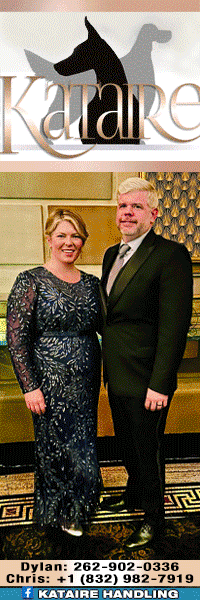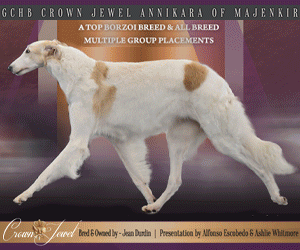For the Good of the Breed
Click here to read the complete article
By William Given
 When I was in Germany many years ago, I learned that in some European countries the parent clubs appoint some of their most knowledgeable and highly respected member breeders to act as “Zucht Wachter,” or breed wardens if you prefer. No longer active breeders when receiving this appointment, their primary responsibility is to serve as breed guardians. They advise breeders as to which breedings are acceptable and would be encouraged, and which matings would be considered as being potentially detrimental to the best interest of the breed and thereby not permitted. This practice is standard operating procedure in those countries and has proven to be highly successful in terms of producing puppies that are correct in conformation as well as being mentally and physically sound. Unfortunately, their system would not at all be tolerated here in the United States. For example, just imagine a breed warden duly appointed by the Poodle Club of America telling Ms. Marcia Malignancy that she would be allowed to breed her precious Poodle, Ch. Fantasia’s Fleur de lis to GCh. Marquis Monsieur Magnifique (sire of five champions by the age of five years). Wow, after all Marcia spent $500 when she purchased her Fleur and another $15,000 getting her finished.
When I was in Germany many years ago, I learned that in some European countries the parent clubs appoint some of their most knowledgeable and highly respected member breeders to act as “Zucht Wachter,” or breed wardens if you prefer. No longer active breeders when receiving this appointment, their primary responsibility is to serve as breed guardians. They advise breeders as to which breedings are acceptable and would be encouraged, and which matings would be considered as being potentially detrimental to the best interest of the breed and thereby not permitted. This practice is standard operating procedure in those countries and has proven to be highly successful in terms of producing puppies that are correct in conformation as well as being mentally and physically sound. Unfortunately, their system would not at all be tolerated here in the United States. For example, just imagine a breed warden duly appointed by the Poodle Club of America telling Ms. Marcia Malignancy that she would be allowed to breed her precious Poodle, Ch. Fantasia’s Fleur de lis to GCh. Marquis Monsieur Magnifique (sire of five champions by the age of five years). Wow, after all Marcia spent $500 when she purchased her Fleur and another $15,000 getting her finished.
For the vast majority of us who share a passion for breeding purebred dogs, genetics can be a very complicated science. Highly successful in the show ring and in the whelping box, breed wardens have all demonstrated that they possess more than just a fundamental understanding of the principles of applied genetics. Perhaps, our breeders deserve the opportunity to breed that really “good one” by whatever means they firmly believe will be successful. After all, Mother Nature provides her own obstacles, do we really need man-made road blocks placed in our paths? In exchange for the amazing freedom we enjoy comes an equally great responsibility.
As breeders, it is easy for us to be thrilled by our successes, but we must face our failures with equal zeal. One of my mentors in this sport of purebred dogs is a man named Thomson Stanfield. He has a natural eye for dogs, is a singularly gifted judge and he loves our sport second only to his wife, Carol, his children and grandchildren. I respect him above all others, and I believe he would say we must be more concerned about our failures as they have great potential to adversely affect our breeds.
Some would suggest that puppies sold as pets, with limited registration, pose no real threat to their breed since any progeny could not be used for breeding. This belief is, of course, false. Municipal shelters all across our great country hold more than their share of purebred dogs not born of show quality parents. Also, there is always the possibility that puppies sold as pet quality will fail to serve well in that capacity since physical faults and mental shortcomings may limit their ability to be the canine companion that was expected at the time of purchase.
The judging that is performed at dog shows is the means by which we award recognition to those dogs we feel are deserving of the opportunity to lend their genetic attributes in a sizable fashion to the betterment of the breed. Each and every time a dog earns championship points, receives a title, or captures the favor of a highly respected judge, for better or worse, it increases that dog’s influence on the breed. Even the dog or bitch that is never bred will add credit to his or her line and the whole of the breed with the acquisition of show ring victories.
Given the distinct possibility of prejudicing a judge’s decision on his or her placements, judges are not permitted (and rightfully so) to examine the show catalog. Exhibitors and breeders all have their opinions as to what are the better lines in a breed and which ones they would avoid given the chance. All judges have been both exhibitor and breeder and should reasonably be expected to possess those same opinions. So, judges are not provided the opportunity to act on the prejudices. They will examine and gait their exhibits and make their awards based solely on the individual dogs’ evaluation, to the Standard, on that day. In the ring, the judge will not know which dogs are prepotent for the traits the breed would derive great benefit from or which dogs were likely the result of an incompatible breeding.
We must face the facts. The American Kennel Club established the many rules and regulations which govern our sport not to serve as road blocks but rather to protect the integrity of the sport. There will always be those people in the sport whose overwhelming desire to win will motivate them to find a way to skirt the system, as though the rules do not apply to them. They see the rules and regulations simply as an attempt to restrain their achievements. The ethical breeders and honest exhibitors always seem to find themselves left with the task of working within the system even while at the same time it seemingly hampers those it was designed to protect.
The Importance of the Standard
Think on the many times you have observed the judging from ringside, the same dogs, same exhibitors, different outcomes, and why? Recently, my wife and I had the opportunity to take in the second of two separate weekend shows. Our focus was on scent hounds and some of the entries consisted of fairly large classes and others noticeably less so. From the class placings through winners dog, winners bitch, best of opposite and best of breed of variety, many of the placings in the larger classes were quite different on the different days. Four judges, three men and one woman (not that gender matters) all with varying years of experience as judges and all with different primary breeds (which may matter greatly). Is it the difference in background and experience of the judges, and their interpretations of the Standards or can the lack of uniformity in judging be credited to the latitude and leeway of the Standards?
The Standards, are of course the responsibility of the National breed clubs. Far too frequently, the Standards are far more vague than they could or should be. To breeders, a Standard serves as a guide. To judges, however, a standard is the written instrument by which he or she evaluates his or her exhibits. Regardless of the Group in which the individual breeds compete, it is enormously vital that dedicated breeders and exhibitors press their national breed club to close the loopholes in any area of their Standard that allow judges the liberty of making awards to dogs lacking the mental soundness to cope with new experiences, or physical correctness to perform the functions for which the breed was developed without impairment.
A standard is fixed until such time it is revised by the national breed club and approved by the American Kennel Club. Judges will evaluate their entries within the framework established by the Standard. A few dedicated, impassioned breeders will strive to produce puppies that will mature to meet and exceed the Standard. Unfortunately, far too many breeders will conduct breedings where the puppies will age and simply reflect what was popular at the time.
Working within the framework of our present system, breeders and exhibitors can create change. Desired change though, will only come to fruition if it is constructive, intelligent and eloquently presented. It will have to be warmly received so it will gain the necessary momentum through local breed clubs and regional clubs but more importantly the parent clubs and eventually the American Kennel Club.
Unquestionably, there are deficiencies in the sport of purebred dogs. Certainly, some of them could be more easily addressed and rectified by a more narrow and critical evaluation of our dogs. For the good of the breed, it is imperative that the sport provide the judges with every positive means possible for evaluating the dogs that are entered under them.
Short URL: http://caninechronicle.com/?p=79721
Comments are closed











